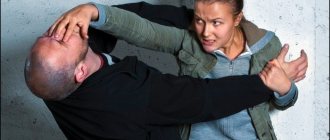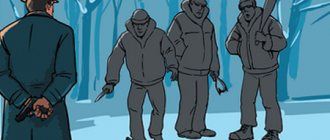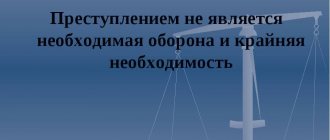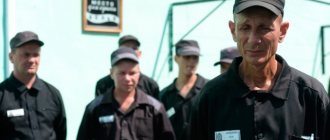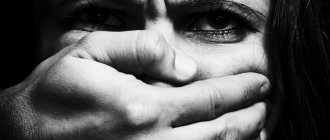Criminal Code of the Russian Federation in the latest edition:
Article 37 of the Criminal Code of the Russian Federation. Necessary defense
1. It is not a crime to cause harm to an attacker in a state of necessary defense, that is, when protecting the personality and rights of the defender or other persons, the legally protected interests of society or the state from a socially dangerous attack, if this attack was associated with violence dangerous to the life of the defender or another person, or with an immediate threat of such violence.
2. Protection from an attack that is not associated with violence dangerous to the life of the defender or another person, or with an immediate threat of such violence, is lawful if the limits of necessary defense were not exceeded, that is, deliberate actions that are clearly inconsistent with the character and the danger of encroachment.
2.1. The actions of a defending person do not exceed the limits of necessary defense if this person, due to the surprise of the attack, could not objectively assess the degree and nature of the danger of the attack.
3. The provisions of this article apply equally to all persons, regardless of their professional or other special training and official position, as well as regardless of the ability to avoid a socially dangerous attack or seek help from other persons or authorities.
Return to the table of contents of the document: Criminal Code of the Russian Federation in the latest edition
Conditions for the legality of necessary defense
The conditions for the legality of necessary defense related to the attack from which protection is carried out are:
a) public danger of encroachment; b) the validity of the attack; c) the existence of the encroachment.
Public danger of encroachment
Necessary defense is permitted only against socially dangerous attacks . Socially dangerous attacks include actions that immediately upon their commission and inevitably cause the onset of real serious harmful consequences for the individual, society or the state, the infliction of which is, in principle, criminally punishable.
Since the law speaks of a socially dangerous attack, and not of a crime, the necessary defense is permissible against the actions of insane persons, as well as persons under the age at which criminal liability begins (clause 5 of the Resolution of the Plenum of the Supreme Court of the Russian Federation of September 27, 2012 No. 19 “On the application by courts of legislation on necessary defense and causing harm when detaining a person who has committed a crime”).
This condition of legality is also violated and does not create the necessary defense: protection from actions, although formally containing signs of any act provided for by criminal law, but knowingly for the one who caused the harm, did not represent due to the insignificance of public danger (Part 2 of Article 14 of the Criminal Code of the Russian Federation) . In such cases, liability arises for an intentional crime on a general basis.
Lawful actions of officials in the performance of their official duties, even if they involve causing harm or the threat of causing it, do not constitute a state of necessary defense (use of force in cases established by law by law enforcement officers when ensuring public safety and public order, etc.) (Clause 6 of the Resolution of the Plenum of the Supreme Court of the Russian Federation dated September 27, 2012 No. 19).
The validity of the encroachment as a condition for the legality of the necessary defense
Defense is permissible only against a real attack , i.e. an encroachment that exists in reality, and not in the imagination of the defender. Causing harm during an apparent but not really existing attack, or causing harm to a person who is not participating in the attack, but is mistakenly taken for the attacker (imaginary defense), is unlawful and punishable depending on the guilt.
The defender’s assumption about the existence of an encroachment in the absence of one is called in criminal law either an imaginary defense or an imaginary defense.
Imaginary defense occurs when the encroachment did not exist in reality and the circumstances gave the person absolutely no reason to believe that it was occurring. In such cases, someone's actions are considered an attack out of fear or self-hypnosis. They are qualified as intentional causing harm on a general basis.
Imaginary defense is a type of factual mistake and occurs when the encroachment did not exist in reality, but the person believed that it was happening. The rules for qualifying an imaginary defense are given in paragraph 16 of the Resolution of the Plenum of the Supreme Court of the Russian Federation of September 27, 2012 No. 19.
In cases where the circumstances of the incident gave reason to believe that a real attack was being committed, and the person who used the means of defense did not and could not realize the error of his assumption, his actions should be considered as committed in a state of necessary defense. If in this case the person exceeded the limits of protection permissible in the conditions of the corresponding real attack, he is subject to liability as for exceeding the limits of necessary defense.
If a person causes harm without realizing the imaginary infringement, but due to the circumstances of the case he should and could have been aware of it, the actions of such a person are subject to qualification under the articles of the Criminal Code of the Russian Federation, which provide for liability for causing harm through negligence.
The existence of an encroachment as a condition for the legality of the necessary defense
The condition of legality is the existence of an encroachment . Establishing this circumstance is associated with determining the initial and final moments of the encroachment. The exercise of the right to necessary defense is possible only during the period of a socially dangerous attack. Thus, defense against a possible attack in the future will be unlawful. However, the state of necessary defense arises not only at the very moment of a socially dangerous attack, but also in the presence of a real threat of attack.
Encroachment begins when an immediate threat is created to legally protected rights and interests. An immediate threat of violence that is dangerous to the life of the defender or another person can be expressed, in particular, in statements about the intention to immediately cause death or harm to health to the defender or another person, dangerous to life, demonstrations to the attacker of weapons or objects used as weapons, explosive devices, if, taking into account the specific situation, there were grounds to fear the implementation of this threat (clause 2 of the Resolution of the Plenum of the Supreme Court of the Russian Federation of September 27, 2012 No. 19).
The state of necessary defense can also be caused by a socially dangerous attack that is ongoing or ongoing in nature (for example, illegal imprisonment, hostage-taking, torture). The right to necessary defense in these cases remains until the end of such an attack.
The actions of the defender who caused harm to the attacker cannot be considered committed in a state of necessary defense if the harm was caused after the attack was prevented or completed and the use of means of defense was clearly no longer necessary. In these cases, liability arises on a general basis.
Thus, clearly premature defense takes place before the start of the attack and is qualified as an intentional crime on a general basis. Obviously belated defense takes place after the obvious end of the encroachment and forms self-destruction against the encroacher; it is classified as an intentional crime on a general basis. If the actions of a person after the obvious end of the assault were committed in a state of passion, the act is nevertheless qualified under Art. 108, 114 of the Criminal Code of the Russian Federation.
Judicial practice under Article 37 of the Criminal Code of the Russian Federation
Appeal ruling of the Judicial Collegium for Criminal Cases of the Supreme Court of the Russian Federation dated 07/02/2019 N 44-APU19-7SP
In the appeal and addition to it, the convicted Borisov V.G. considers the sentence illegal and unfounded, passed in violation of the norms of criminal and criminal procedural law. He claims that the court's conclusions about his guilt do not correspond to the actual circumstances of the case, the criminal case was considered with an accusatory bias, as evidenced, in particular, by the refusal to satisfy his petitions. He asks for an examination of the video materials, pointing out their falsification and editing. He gives arguments according to which he was forced to defend himself from the unlawful actions of the victims, and asks to change the qualifications of his actions, taking into account the provisions of Art. Criminal Code of the Russian Federation.
Appeal ruling of the Judicial Collegium for Criminal Cases of the Supreme Court of the Russian Federation dated November 21, 2019 N 45-APU19-25
In addition, recognizing the actions of Hopfauf E.Ya. regarding the deprivation of P.’s life committed in a state of necessary defense, the court did not refer to the norm of substantive law, namely Art. of the Criminal Code of the Russian Federation and did not make any procedural decision in connection with the recognition of the actions of the convicted person to take P.’s life as legal (they did not stop the criminal prosecution in part or did not acquit in part) by issuing an appropriate resolution or indication in the operative part of the sentence, and also did not explain Hopfauf E.Ya. the right to rehabilitation in accordance with the requirements of Art. 133 Code of Criminal Procedure of the Russian Federation.
Determination of the Constitutional Court of the Russian Federation dated December 19, 2019 N 3306-O
OF THE RIGHTS OF THE ARTICLES OF THE CRIMINAL CODE OF THE RUSSIAN FEDERATION The Constitutional Court of the Russian Federation, composed of Chairman V.D. Zorkin, judges K.V. Aranovsky, A.I. Boytsova, N.S. Bondar, G.A. Gadzhieva, Yu.M. Danilova, L.M. Zharkova, S.M. Kazantseva, S.D. Knyazeva, A.N. Kokotova, L.O. Krasavchikova, S.P. Mavrina, N.V. Melnikova, Yu.D. Rudkina, V.G. Yaroslavtseva,
Determination of the Constitutional Court of the Russian Federation dated June 30, 2020 N 1410-O
THE RIGHTS OF APPLICATION OF THE ARTICLE OF THE CRIMINAL CODE OF THE RUSSIAN FEDERATION The Constitutional Court of the Russian Federation composed of Chairman V.D. Zorkin, judges K.V. Aranovsky, A.I. Boytsova, N.S. Bondar, G.A. Gadzhieva, Yu.M. Danilova, L.M. Zharkova, S.M. Kazantseva, S.D. Knyazeva, A.N. Kokotova, L.O. Krasavchikova, S.P. Mavrina, N.V. Melnikova, Yu.D. Rudkina, V.G. Yaroslavtseva,
Appeal ruling of the Judicial Collegium for Criminal Cases of the Supreme Court of the Russian Federation dated 02/09/2017 N 34-APU17-1sp
In addition, questions containing such wording as “foreseeing the inevitability of death and wishing for it”, “fearing for one’s life and health, as well as for the life and health of one’s son”, which are evaluative and related, could not be used in the questionnaire. with the determination of the type of intent of Mikhailovsky (Article and Criminal Code of the Russian Federation), as well as the presence of the necessary defense or its excess (Article and Article 108 of the Criminal Code of the Russian Federation), that is, they relate to legal issues that must be resolved without the participation of a jury by the presiding judge alone, based on factual circumstances established by the verdict of the jury.
Appeal ruling of the Judicial Collegium for Criminal Cases of the Supreme Court of the Russian Federation dated 01.03.2017 N 55-APU17-2
According to Part 1 of Art. The Criminal Code of the Russian Federation does not make it a crime to cause harm to an attacker in a state of necessary defense, that is, when protecting the personality and rights of the defender or other persons, the legally protected interests of society or the state from a socially dangerous attack, if this attack was associated with violence dangerous to the life of the defender or another person, or with an immediate threat of such violence.
Appeal ruling of the Judicial Collegium for Criminal Cases of the Supreme Court of the Russian Federation dated March 16, 2017 N 50-APU17-1
Motivating the conclusion that the convict was guilty of the attempted murder of K. and causing harm to Zh.’s health, the court reasonably accepted as evidence the testimony of the victims of Zh.K. that the initiator of the quarrel was the convict himself, hitting K. in the face with his fist, and then he is stabbed with a knife. When Zh. tried to prevent Adyrbaev, he stabbed Zh. The circumstances indicated by the victims inflicting bodily injuries on them were confirmed by the testimony of witnesses F. and F. and expert opinions on the presence of bodily injuries on the victims and the convicted person. Meanwhile, according to the provisions of Art. The Criminal Code of the Russian Federation does not recognize a person who provoked the victim as being in a state of necessary defense in order to use his retaliatory actions as a reason to commit an unlawful act, including one aimed at depriving the victim of his life. What was done in these cases is subject to qualification on a general basis.
Appeal ruling of the Judicial Collegium for Criminal Cases of the Supreme Court of the Russian Federation dated April 18, 2017 N 9-APU17-3
Based on the totality of evidence in the case, the court came to a reasonable conclusion that in the case under consideration, the grounds for applying Art. There were no criminal codes of the Russian Federation; it was not a socially dangerous attack, in which the right to necessary defense arises, but a conflict based on personal hostility against the background of alcohol consumption, which resulted in the intentional death of two persons.
Appeal ruling of the Judicial Collegium for Criminal Cases of the Supreme Court of the Russian Federation dated November 7, 2017 N 14-APU17-12
Provided by Art. The Criminal Code of the Russian Federation does not see signs of necessary defense or its excess in the actions of convicts. The punishment assigned to each of them complies with the requirements of the law. It is proportionate to all the circumstances established in the case, is fair and cannot be mitigated.
Determination of the Judicial Collegium for Criminal Cases of the Supreme Court of the Russian Federation dated May 29, 2018 N 69-UD18-7
In the cassation appeal, the convicted Semenov S.O. disputes the validity of the court decisions taken against him and asks for their review, pointing out that he did not have the intent to cause M. grievous harm to health, but was defending himself from the unlawful actions of the victim himself, who attacked him, and in whose hand there was a knife. He believes that he was in a state of necessary defense, but he did not understand how the knife got into the victim’s body after he twisted the knife out of the victim’s hand. In addition, he points out that the court did not check whether he was in a state of strong mental agitation during the commission of these actions against the victim, and the court also did not take into account as a mitigating circumstance the fact that before everything happened, he asked neighbor O. to call the police, because M. became rowdy, and also after the incident he asked her about it. Believes that the court had grounds to apply Art. of the Criminal Code of the Russian Federation when assigning punishment to him. He asks to reclassify his actions taking into account the provisions of Art. of the Criminal Code of the Russian Federation, as well as apply Art. Criminal Code of the Russian Federation.
Appeal ruling of the Judicial Collegium for Criminal Cases of the Supreme Court of the Russian Federation dated January 22, 2019 N 55-APU18-5
In this case, it should be assumed that in the case there are no grounds for applying the rules of Art. Art. , Criminal Code of the Russian Federation. Under certain circumstances, convicted persons could file complaints with the competent government authorities. The statement of lawyer A.A. Golovchenko is unfounded. about the failure of the court of first instance to establish the amount of damage caused by FKU IK....
Protection from an attack involving violence dangerous to the life of the defender
Criminal law knows two types of necessary defense , depending on the nature of the attack on the defender (absolute and relative).
In the first case, if the attack from which protection is carried out is associated with violence dangerous to the life of the defender or another person, or with an immediate threat of such violence, the necessary defense is absolute , i.e. allows any harm (including fatal harm) to be caused to the offender. In this situation, raising the question of exceeding the limits of necessary defense in itself is impossible (clause 2, 10 of the Resolution of the Plenum of the Supreme Court of the Russian Federation of September 27, 2012 No. 19).
As stated above, a socially dangerous attack must be associated with violence dangerous to the life of the defender or another person, or with an immediate threat of such violence. In this case, the danger to life must be objectively existing, real . Otherwise, the actions of the defender may be regarded as imaginary defense, which entails criminal liability, or, if the defender is in good faith and there is reason to believe that there is a danger to life, the actions of the defender should be assessed as innocent causing of harm.
The presence of a socially dangerous attack involving violence dangerous to the life of the defender or another person may be evidenced, in particular, by:
- causing harm to health that creates a real threat to the life of the defender or another person (for example, injury to vital organs);
- the use of a method of assault that creates a real threat to the life of the defender or another person (use of weapons or objects used as weapons, strangulation, arson, etc.).
Conclusion
As we can see from the above example, when assessing the actions of the defender, the court took into account the extremely short period of time between the suppression (exceeding the limits of necessary defense) by Shishkin of the unlawful encroachment on the part of Ushkov and Ulyanov and the emergence of an imaginary threat from the approaching Semenov and Krutikov.
The court came to the conclusion that this circumstance, taking into account the intensity of the assault committed, did not allow the defender to adequately assess the situation in terms of establishing the presence and degree of threat posed by surrounding persons (sentence of the Baryshevsky City Court of the Sverdlovsk Region, a certificate based on the results of a study of the practice of application by courts of the rules on necessary defense and other circumstances excluding the criminality of the act, in cases considered in 2009 - the first half of 2011).
Thus, in practice, both the category of surprise of an attack is used when assessing the actions of the defender within the framework of necessary defense, and the category of imaginary defense.
Each attack is associated with a traumatic situation for the defender, which must also be taken into account; this issue will be discussed in the article: Correlation of necessary defense with a traumatic situation. How can the combination of these two categories help defense?
Author – lawyer Mikhail Vladimirovich Spiridonov
Admissibility of protection from an attack involving violence that is not dangerous to the life of the defender
In the second case, if the attack from which the defender is defending himself is not associated with violence dangerous to the life of the defender or another person, or with an immediate threat of such violence, the necessary defense is relative in nature and is recognized as legitimate only if the limits of necessary defense are not exceeded.
When protecting objects other than human life, the restrictions established by Part 2 of Art. 37 of the Criminal Code of the Russian Federation. At the same time, it should be borne in mind that in some cases, causing death in the absence of an assault involving violence dangerous to the life of the defender or another person, or with an immediate threat of such violence, may also be lawful. For example, a woman causing death to her attacker during rape should be recognized as lawful.
Failure to comply with the restrictions specified in the law, i.e. exceeding the limits of necessary defense must consist of deliberate actions that are clearly inconsistent with the nature and danger of the attack.
In the case of an encroachment that is not associated with violence dangerous to the life of the defender or another person, or with an immediate threat of such violence, exceeding the limits of necessary defense is associated with the defender’s awareness of the wrongness and danger of his actions at the time of causing harm. In other words, the defender must clearly realize that he has the opportunity to protect himself from an attack and stop it by using other means of defense, with less intensity, causing significantly less harm to the attacker compared to what was actually caused. Thus, the defender should not strive to reprisal the attacker, but to stop his actions and cause only the harm necessary to repel the attack. But at the same time, the ability of the defender to run away, call for help, or otherwise evade the attack has no legal significance. The presence of such a possibility should in no case be regarded as a factor in exceeding the limits of necessary defense.
Under assault, protection from which is permissible within the limits established by Part 2 of Art. 37, it should be understood as the commission of socially dangerous acts involving violence that is not dangerous to the life of the defender or another person (for example: beatings; causing minor or moderate harm to health; robbery committed with the use of violence that is not dangerous to life or health).
In addition, such an encroachment is the commission of other acts (actions or inactions), including negligence, provided for by the Special Part of the Criminal Code, which, although not associated with violence, however, taking into account their content, can be prevented or suppressed by causing harm to the offender. Such encroachments include, for example, intentional or careless destruction or damage to someone else’s property, rendering life support facilities, vehicles or means of communication unusable (clause 3 of the Resolution of the Plenum of the Supreme Court of the Russian Federation of September 27, 2012 No. 19).
